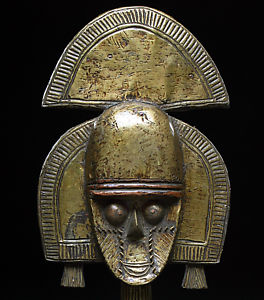| Location: |
Northern Nigeria, southwestern Niger | | Population: |
n/a |
| Language: |
Fulbe languages |
| Neighbors: |
Hausa, Tuareg |
| Types of Art: |
Wodaabe weave and dye beautiful cloth that is considered extremely valuable throughout western Africa. |
| History: |
Wodaabe peoples are acutually a subgroup of the larger Fulbe-speaking Fulani. They prefer to call themselves Bororo. Fulani are a nomadic people who have been influential in regional politics, economics, and histories throughout western Africa for over a thousand years. Wodaabe live in northern Nigeria and played a significant role in furthering Fulani domination in the area. The height of the Fulani empire was between the early 1800s and early 1900s. This power was consolidated under Usman dan Fodio and was centered in northern Nigeria. Dan Fodio was a devout Muslim who used religious fervor to ignite his troops to undertake a series of holy wars. Following the early success of Islamic warriors, non-Islamic Fulani joined ranks with their fellows to form an extensive and powerful empire. |
| Economy: |
Wodaabe are mainly nomadic herders and traders. The routes they established in western Africa provided extensive links throughout the region that fostered economic and political ties between otherwise isolated ethnic groups. Dairy products produced from cattle were traded to sedentary farmers for agricultural products and luxury items. These items could then be traded to trans-Saharan traders such as the Tuareg for shipment north. Fine woven cloth produced by the Wodaabe was considered a luxury item that could be traded on the international market. |
| Political Systems: |
The two most significant factors in Fulani political systems are clientage and competition. In order to gain political office a Fulani man would have to compete among his fellows for the right to rule. He could show his political favor by demonstrating that he had a large following in the form of individuals and families. By agreeing to become the client of a powerful man or family, a subject would offer tribute in the form of gifts and political support in exchange for security. Wodaabe men often held considerable political power within their own nomadic communities, as well as within the communities in which they settled in northern Nigeria. |
| Religion: |
Wodaabe religion is largely Islamic. Although there are varying degrees of orthodoxy exhibited, most adhere to at least some of the basic requirements of the religion. It is usually the case that the wealthy and powerful are among the most religious, while those who have fewer resources are less likely to strictly observe their religion. Islam has been used to justify the holy jihads that brought the northern territories of modern day Nigeria under the auspices of Wodaabe and Fulani leadership. Historically, it has not been unusual that such political and economic gains would be made in the name of Islam and result in empire building. Islam became a religion of importance among Wodaabe peoples during the 16th century when the great prophet El Maghili preached the teachings of Mohammed to the elite of northern Nigeria. El Maghili was responsible for converting the ruling classes among Hausa, Fulani, and Tuareg peoples in the region.
|
| Credit: |
McIntyre, L. Lee and Christopher D. Roy. 'Art and Life in Africa Online.' 1998: The Art and Life in Africa Project, http://www.uiowa.edu/%7Eafricart/toc/people.html |
|

